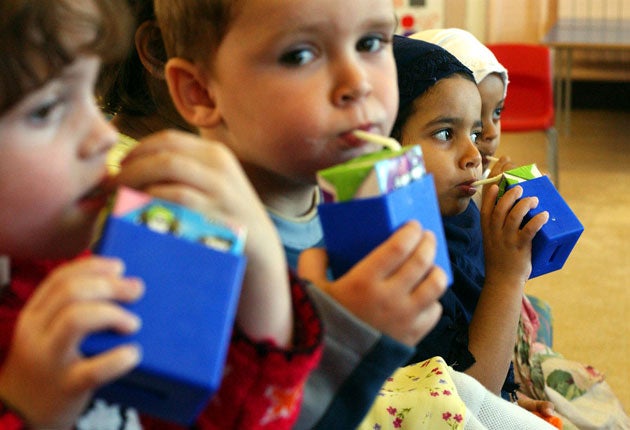Tories move swiftly to avoid 'milk-snatcher' tag

Your support helps us to tell the story
From reproductive rights to climate change to Big Tech, The Independent is on the ground when the story is developing. Whether it's investigating the financials of Elon Musk's pro-Trump PAC or producing our latest documentary, 'The A Word', which shines a light on the American women fighting for reproductive rights, we know how important it is to parse out the facts from the messaging.
At such a critical moment in US history, we need reporters on the ground. Your donation allows us to keep sending journalists to speak to both sides of the story.
The Independent is trusted by Americans across the entire political spectrum. And unlike many other quality news outlets, we choose not to lock Americans out of our reporting and analysis with paywalls. We believe quality journalism should be available to everyone, paid for by those who can afford it.
Your support makes all the difference.Cameron the milk kleptomaniac, Dave the dairy cutter? Journalists would have struggled to devise a sobriquet as damaging as Thatcher the milk snatcher for the current Conservative leader, but David Cameron was taking no chances on acquiring a nickname yesterday when he strangled a plan by one of his ministers to abolish free milk for nursery children.
The politically awkward proposal had been under active consideration by the Department of Health but was now "not happening", the Prime Minister's aides stated firmly – at the very moment one of his lieutenants was defending it on television.
The U-turn came hours after Mr Cameron had written an article in a Sunday newspaper explaining that the Government should allow "no sum of waste too small to escape the microscope of efficiency".
Looking for cuts, Anne Milton, a Health minister, had proposed ending the £50m-a-year Nursery Milk scheme, describing it as ineffective and expensive. In a letter to the Scottish Executive, leaked to a Scottish newspaper, she wrote: "There is no evidence that it improves the health of very young children yet the cost of delivering it is increasing significantly."
The Department of Health confirmed the plan was an "option" for the forthcoming spending review that all departments are grappling with, and the Universities minister David Willetts, one of the PM's brightest colleagues, was appearing live on television seeking to justify it on the BBC's Andrew Marr Show when Mr Cameron's aides baldly stated he "did not like" the idea. A BBC presenter broke the news to Mr Willetts on air.
Cutting nursery milk would have drawn comparisons with Edward Heath's Tory administration in the early 1970s, when Mrs Thatcher, as Education Secretary, ended free school milk for children aged seven to 11. Under the remnants of a scheme rooted in 1940s food shortages, children under five retained their right to milk. One and a half million children in England receive one-third of a pint a day.
With every Whitehall department required to identify cuts, Ms Milton concluded the scheme was a waste of money because it was available to all children, rich or poor. She set out her views to the Scottish Public Health Minister Shona Robison, who runs the scheme in Scotland, on 3 August: "We think the scheme is out of step with the principle that public funding should focus on the most needy." She warned: "Abolition of the scheme will be contentious and we can expect opposition from the media, parents, nurseries, childminders and the dairy sector. However... this would clearly be the best time to do it given the state of public finances and the need to make savings."
Health campaigners and opposition politicians criticised the plan. Tam Fry, honorary chairman of the Child Growth Foundation, denounced the idea, saying milk was "absolutely vital for children in their growing years, particularly pre-school". David Miliband, one of the two Labour leadership front-runners, said: "A new Tory government scrapping free milk has dark echoes of Thatcher snatching milk from a previous generation and will cause as much fury as before."
The BBC relayed Downing Street's displeasure to Mr Willetts, who replied: "We have an endless process of assessing options. It is inevitable that if you go through those decisions some options go ahead and others don't. That is how decisions are taken."
What is little known is that Mrs Thatcher actually opposed ending school milk and was forced into the position by the Treasury. She was so upset by the public response that she considered quitting politics. In her autobiography, she wrote: "I learned a valuable lesson. I had incurred the maximum of political odium for the minimum of political benefit." Mr Cameron is likely to have read those words.
School milk controversy
Introduced in wartime
Free milk began in 1940 to ensure that young children had strong bones and teeth at a time of food shortages. The policy continued until the 1970s when, as Edward Heath's government struggled to control public finances, the Education Secretary Margaret Thatcher scrapped free milk for seven- to 11-year-olds. Despite the "Milk snatcher" moniker, she had privately opposed the plan and successfully argued for keeping free nursery milk.
One third of a pint a day
Labour revived and then abandoned free milk for older children, but under-fives have always had it. Children under five in approved day care receive 189ml (one third of a pint) each day, while babies under 12 months can receive dried baby milk made up to 189ml. Healthy Start food vouchers are available to poor parents.
More expensive every year
In five years the annual cost of the scheme in England has almost doubled to £50m. Instead of giving free milk to all under-fives, Anne Milton, a Health minister, suggested raising the value of Healthy Start vouchers.
Join our commenting forum
Join thought-provoking conversations, follow other Independent readers and see their replies
Comments